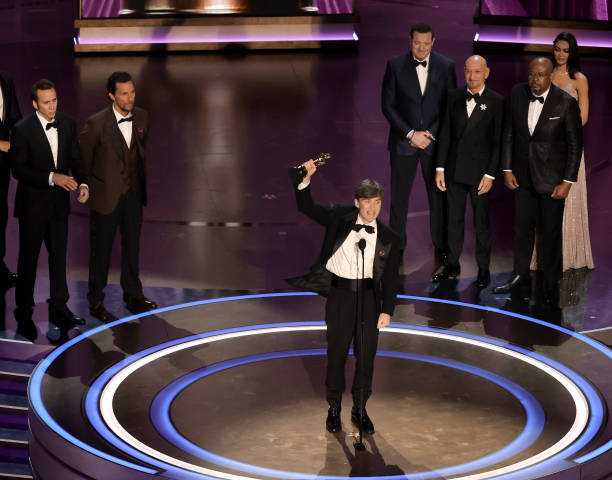The 96th Academy Awards ceremony, also known as the Oscars, took place on March 10, 2024. The Academy Awards are an annual award show that recognizes artistic and technical merits in specific films. The awards are given out by the Academy of Motion Picture Arts and Sciences, a group that includes actors, writers and other film industry professionals.
This year, Christopher Nolan’s “Oppenheimer” took the Oscars by storm. A chilling film about the development of the atomic bomb during World War II, “Oppenheimer” was released in late July. At the end of the night, “Oppenheimer” accrued a total of seven awards, including Best Actor, Best Cinematography and Best Original Score.
One notable moment was Al Pacino’s presentation of Best Picture. Despite the thrill of seeing the veteran actor bestow the award, his awkward statement of “[my] eyes see Oppenheimer” left the audience momentarily confused and dampened the usual fanfare around the night’s largest award. Instead of announcing all of the nominations, as is customary, Pacino only mumbled the winner before exiting the stage. The nominees were only mentioned in small videos of the film played before each new category. In an interview with the New York Times, he explained that it was the producers’ choice to omit the names. While it took a moment for everybody to realize the winner had been announced, the “Oppenheimer” cast and crew were thrilled.
“Oppenheimer” was part of an odd pair of blockbuster films this summer. Released on the same day, “Oppenheimer” and “Barbie” quickly became known as “Barbenheimer,” with people often watching both films in one day. Despite the differing themes, both movies became fan favorites and received multiple Oscar nominations.
With five nominations in different categories and 1.4 billion dollars in box office sales, the “Barbie” team had high hopes for the award show. Despite the film’s success, there was controversy over the lack of recognition for Greta Gerwig’s directing, and Margot Robbie’s performance. While “Barbie” beat “Oppenheimer” at the box office, the Oscars portrayed a different story. In the end, only Billie Eilish and Finneas O’Connell’s “What Was I Made For?” won an award.
The animation category caused controversy as well, with some criticizing the Academy over the way nominations and voting for animated films have been handled.
As junior Sadie Lachman explained, animated films can be nominated for any category, “but [they’re] never judged through the same lens because they are treated as kids movies.”
Furthermore, since any Academy member is allowed to vote for an animated film, people who have no understanding of the art medium are able to impact the nominations. In the end, most people vote for the films their kids enjoyed the most, one of the main reasons why Disney often wins animation awards.
Because the Oscars have a single award for the entire medium, despite its complexity, and allow any Academy member to vote, animation is often shunted to the side. Lachman added that “animation is not a single genre, but it’s being judged like it’s a genre. It should be judged as a medium where the focus is on the process of animating, not the film in entirety.”
In the last couple of years, controversy arose when the Oscars cut rotoscoping, a method of tracing real life videos onto animation cells, from the entire category. Some people do not consider this to be a legitimate process, because the artist is not drawing out the complete movement and is instead taking it from another source.
The night celebrated many achievements in film over the past year but, as some critics always urge, failed to adequately acknowledge others.











































